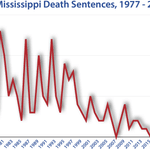
State & Federal
Mississippi

History of the Death Penalty
From 1804 – 1940, all executions in Mississippi were carried out by hanging. The first execution by electrocution took place on October 11, 1940. From then until 1952, the electric chair was moved from county to county for 75 executions. Inmates were executed by lethal gas from 1954 – 1989. In 1984, the Mississippi legislature amended the state’s death penalty statute to provide for lethal injection for all individuals sentenced to death after the law went into effect. Inmates sentenced prior to the change were still executed by lethal gas. In 1998, lethal gas was removed as an option.
Timeline
1818 — Mississippi carries out its first documented execution.
1940 — The portable electric chair replaces hanging as the primary method of execution in Mississippi. Hilton Fortenberry is the first person in Mississippi to be executed by electric chair.
1955 — In a botched execution lasting 45 minutes, Gerald Gallego is the first person to be executed by lethal gas. Louisiana then adds an additional step to the required testing of the gas chamber to include placing an animal in the chamber to test if the mixture of gas is sufficiently lethal.
1984 — The Mississippi legislature amends the state’s death penalty statute to allow lethal injection for all individuals sentenced to death once the law goes into effect. Inmates sentenced prior to this statute still faced execution by lethal gas.
1998 — Lethal gas is removed as an option for method of execution.
2002 — Tracy Hansen is the first person to executed by lethal injection in Mississippi.
2011 — A bill is introduced to impose a moratorium on executions but the state legislature does not pass the bill.
2015 — A federal judge blocks Mississippi from using the sedatives pentobarbital and midazolam in its lethal injection execution protocol. Midazolam has been implicated in executions gon awry in Ohio, Oklahoma, and Arizona.
2017 — Mississippi appeals court grants Sherwood Brown a new trial after reviewing exculpatory results of DNA testing and evidence. Mr. Brown’s death sentence conviction was obtained as a result of misleading forensic testimony.
2020 — Curtis Flowers is exonerated after spending 23 years on death row. Mr. Flowers was tried capital murder six times by the same prosecutor, Doug Evans, and has faced numerous issues with prosecutorial misconduct and racial bias in jury selection in his trials.
2021 — Mississippi carries out the execution of David Cox by lethal injection. This is the first execution carried out in nearly a decade.
2022 — Mississippi legislature passes a law allowing corrections officials to chose their preferred execution method by either lethal injection, electrocution, firing squad, or nitrogen hypoxia.
Notable Exonerations
Sabrina Butler was 17 years old when her 9‑month old son, who had a heart murmur, stopped breathing. After attempts to resuscitate her son, Butler rushed to the hospital, where the young child was pronounced dead. The following day Butler was arrested for child abuse due to the bruises left by her resuscitation attempts. She was interrogated by the police and then prosecuted. Then, in 1990, she was convicted of capital murder and sentenced to death.
Her conviction was overturned by the Mississippi Supreme Court in 1992. (Butler v. State, 608 So.2d 314 (Miss. 1992)). The court said that the prosecution had failed to prove that the incident was anything more than an accident. At re-trial, she was acquitted on Dec. 17, 1995 after a very brief jury deliberation. It is now believed that the baby may have died either of cystic kidney disease or from sudden infant death syndrome (SIDS).
Milestones in Abolition/Reinstatement
In 2011, a bill was introduced to impose a moratorium on executions. The bill did not pass the state legislature.
Other Interesting Facts
Mississippi was one of two states to use a portable electric chair, and the first state to do so.

Resources

Mississippi Execution Totals Since 1976
News & Developments
News
Jun 04, 2025
2025 Roundup of Death Penalty Related Legislation
More than one hundred bills have been introduced this year in 34 states and in Congress to expand and limit use of the death penalty, abolish and reinstate the death penalty, modify execution protocols and secret the information about them, and alter aspects of capital trials. Thus far, nine bills in five states have been enacted, with Florida enacting the most legislation. Of the bills that have been signed into law, three modify execution protocols; two expand…
Read MoreNews
Mar 28, 2025
“He Looks a Little Like the Defendant”: A Closer Look at the History of Racial Bias in Jury Selection
As closing arguments of his trial began in Johnston County, North Carolina, Hasson Bacote watched as Assistant District Attorney Gregory Butler urged the jury to sentence him to death. Mr. Bacote, a Black man, had been convicted of fatally shooting 18-year-old Anthony Surles during a robbery when Mr. Bacote was just 21 years old. Mr. Bacote admitted he had fired a single shot out of a trailer, but said he did not know that he hit anyone.“Hasson Bacote is a thug: cold-blooded…
Read MoreNews
Dec 20, 2023
Batson Relief for Another Mississippi Prisoner Prosecuted by Doug Evans
Brandonrush, CC0, via Wikimedia…
Read MoreNews
Dec 07, 2023
Mississippi Supreme Court Delays Decision on Willie Manning Execution Date, Allows Time for Appeal
Courtesy of Krissy Nobile, Mr. Manning’s…
Read MoreNews
Nov 10, 2023
A Veterans Day Review: Uneven Progress Understanding the Role of Military Service in Capital Crimes
In 2015, DPIC’s Battle Scars report brought worldwide attention to the issue of military veterans on death row. DPIC found approximately 300 veterans incarcerated under a sentence of death, representing at least 10% of death row, and many more who had been executed. Since that report, research and understanding about Post-Traumatic Stress Disorder (PTSD), traumatic brain injury (TBI), substance use disorders, and mental illness among veterans has…
Read More


